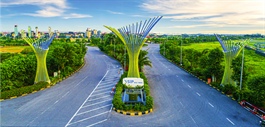High prices trouble people and businesses
High prices trouble people and businesses
Though the consumption and use of services have increased compared to the peak of the COVID-19 pandemic, consumer demand is still low while commodity prices have reached a new height.

According to experts, as input costs for raw materials, labour and gasoline price rises, incomes have stagnated or even decreased. With commodity prices rising, this is creating a "price storm" for families.
Working as a fruit transporter at the Long Bien wholesale market in Ha Noi, Nguyen Van Nam, 34, said: "There were almost no jobs during the pandemic, we have jobs to do now, but our income has not increased. We just have enough to cover daily living."
His wife, Nguyen Thu Hien, added: "The rent, food, transportation, shopping prices increased, so the family's spending must be very economical. When the new school year comes, it's very difficult to pay for textbooks and school fees for the children, so it is generally extremely difficult. If the prices of things return to the same as before the pandemic, people will feel easy."
Many services have experienced a reduction in the number of visitors. Many restaurants, eateries, entertainment services, and health care closed since the pandemic has not yet reopened. Some that tried to reopen closed again a few months later to expensive costs and a decrease in customers.
Dang Quang Tung, a former owner of a crowded fish noodle shop on Luong Dinh Cua Street in Ha Noi, said since the beginning of the year, the number of customers has decreased. At the same time, prices for raw materials and workers' wages increased, making him lose millions of dong every day.
"I kept the restaurant running until April and had to close to move to another job," Tung said. "Doing business is very difficult now because people's income is very low, the cost of everything is so high that every home has to consider living."
As well as domestic consumer goods anchored at high prices, raw materials and fuel has increased, causing many enterprises' production and business activities to come to a standstill.
From the beginning of the year, the price of most construction materials have gone up. For example, the price of cement has increased by 70 per cent compared to the fourth quarter of 2020, steel has increased by nearly VND400,000 per tonne compared to the beginning of the year and is showing signs of increasing again, and the price of construction bricks, stones, and sand also increased by 30-35 per cent compared to the end of 2021. Furthermore, labour costs have also increased, causing many projects to delay or stop construction if they do not want to lose money.
Tran Minh Hien, a private construction contractor in Ba Dinh, said that from the end of 2021 he received three construction projects for residential houses, but so far, only one has started, and progress is very slow.
Hien added: "Seeing the price of materials and workers increase, I had to renegotiate with the owners to postpone the construction of the other two."
Nguyen Van Ket, Director of SKD Vietnam Precision Engineering Company, said that suppliers have announced a 15-20 per cent increase in the price of raw materials depending on the type of product, forcing products price rises in kind.
Finishing repairing her house in Thuy Phuong Street, Nguyen Minh Ngoc, 40, told Viet Nam News: "I have to pay VND1.6 billion for all the construction work, though I only planned VND1 billion. I thought it should be enough but the prices forced me to borrow from the bank. Now I have debt."
According to many economic experts, the price of raw materials is at a high level worldwide. As Viet Nam imports a lot of raw materials, the high prices will pressure enterprises' production, pushing up domestic consumer goods' prices and reducing the quantity demanded.
Therefore, in addition to the Government's policies to promptly support enterprises, employment and income for workers must be ensured. Furthermore, price management, control of supply and demand of goods, and market management must be conducted regularly and continuously towards a transparent market as the driving force of economic development.
In late August, General Statistics Office (GSO) announced that the local consumer price index (CPI) increased slightly by 0.005 per cent from the previous month. Among the 11 groups of main consumer goods and services, nine reported price hikes.
To actively respond to challenges posed by increasing inflation pressure, the Government has directed ministries, sectors and localities to take concerted measures to stabilise prices and minimise inflation's negative impacts on socio-economic development.


















